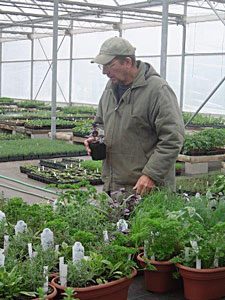2/27/2014
From Tobacco to Tarragon
Anne-Marie Hardie

When Deb Benner joined her husband Tom’s family farm she never imagined that this once thriving tobacco farm would evolve into herbs. But that’s exactly what happened. Deb fondly states that the family went from “tobacco to tarragon.” This simple phrase perfectly encapsulates the transformation that occurred on their Elgin County farm.
The Benner family has been tobacco farmers in Simcoe, Ontario, since 1931 when Tom’s grandfather Ward Benner was introduced to flue-cured Virginia tobacco. Sixty years later, the business was thriving and Deb and Tom became actively involved in the family farm.
Pictured: Tom Benner, owner of Heritage Line Herbs, inspects a new crop of herbs in the greenhouse.
However, things quickly changed. In the late ’90s, there was a shift in the tobacco industry as government support waned and awareness grew about its negative health implications. Committed to keeping the farm in their family, Deb and Tom actively started to seek other green opportunities.
In 2002, Deb stumbled upon a possible solution—a nearby herb wholesale company that was for sale. After a few preliminary visits, Deb and Tom agreed to take over the business and opened their own wholesale herb company, Heritage Line Herbs. The learning curve was steep, but the family embraced the change and quickly became experts in their new chosen field.
So, if one word could describe the Benner family, it would be resourceful. Instead of investing in new materials for their new venture, they reconfigured their greenhouse and land to fit the needs of herbs. In the first year, they had 30 types of potted herbs for sale and 35 wholesale consumers. The company continued to grow, expanding to 60 varieties and doubling the customer base.
Selling strictly wholesale herbs was not the most financially viable enterprise for the Benner family. There were challenges with both the unpredictable nature of the business (contracts confirming quantities were fairly uncommon) and the high cost of shipping. To ensure that their herbs met a market, Deb and her family decided to extend into retail, converting the old tobacco bunkhouse into a charming gift shop. Not one to let anything go to waste, Tom and Deb expanded their enterprise even further by drying their leftover herbs in the old tobacco kilns.
“We used old tobacco kilns to dry the herbs and with the dried herbs created blends such as ‘Better Than Salt’ and ‘Mamma Mia,’ that could be sold in the retail outlet,” Deb says.
In the first year, the sale of their dried herbal blends was fairly slow. Today, Heritage Line Herbs sells more than 20 dried herbs and herbal blends, both online and in their on-site retail store. Deb happily shares that the bigger challenge today is keeping her dried products on the shelf.
Organics is another area in which Deb and Tom have become engaged. They currently grow 4 acres of field herbs that are certified organic. One of the learning curves with an herbal farm, shared Deb, was adapting to 100% biological pesticides (using primarily beneficial insects) and organic fertilizers. For Deb, this practice is essential when offering a food-based product.
When asked for a word of advice, Deb shares the importance of knowing your target market. “If people want to get into this type of business, I would recommend that they research the target market and aim for that,” she says. “With us, we started with wholesale potted herbs. That was where most of our investments went. But we have learned that potted herbs (are) a pretty small market; it’s our dried herbs that we ship all over Canada.”
Knowing their target market has opened up the doors for the successful expansion in the food industry, including the much-loved Silver Birch Tearoom. Inspired by their daughter Lori’s wonderful stories of the beautiful teahouses in Vietnam, the tearoom is the perfect venue to showcase the family’s culinary delights. Surrounding the tearoom are herb-inspired themed gardens including Little Italy, a pizza garden where you can pick your own herbs, a tea garden and a fairy trail that ends with meeting Geranium Garden Gnome.
Initially, the tearoom offered guests tea, jams and baked goods all infused with the herbs grown at Heritage Line Herbs. Raspberry chocolate mint is Deb’s personal favorite, although she shares that the cherry lemon balm and peach tarragon jams are also amazing. Both their retail and online outlets sell jams, vinaigrettes and 13 varieties of herbal teas, all created from the dried herbs from the Benner’s own garden. Over the years, the business continued to expand and now includes its own line of gourmet pizza.
“Everything in our gourmet pizza line is made with our herbs. It is hand tossed and we use local products,” says Deb. “The top favorites are a basil pesto pizza, which includes roasted artichoke, roasted pepper and onions, and the scorcher, which includes heirloom hot peppers.”
The pizzas are sold both in their retail outlet and in their tearoom. The tearoom (which is mainly an outdoor venue) operates from June until September. During the off-season, the gift shop has an array of local and Heritage Herb-grown food products. This year, they opened up their doors on Valentine’s Day to offer their customers a homemade heart-shaped pizza and a Valentine-inspired Brazilian chocolate pizza.
“Our business has totally changed from a wholesale herb farmer to developing food products inspired by our herbs,” Deb says.
She believes it’s the passions of everyone involved that has made Heritage Line Herbs such a success. “It’s all learning and remembering; it’s been an interesting journey,” she adds.
This action-oriented family has learned first hand the positive results that come from hard work, commitment and passion. But perhaps the true secret to this family’s success is their ability to act on their dreams and make them a reality.
GT
Anne-Marie Hardie is a freelance writer/speaker from Barrie, Ontario, and part of the third generation of the family-owned garden center/wholesale business Bradford Greenhouses in Barrie/Bradford, Ontario.